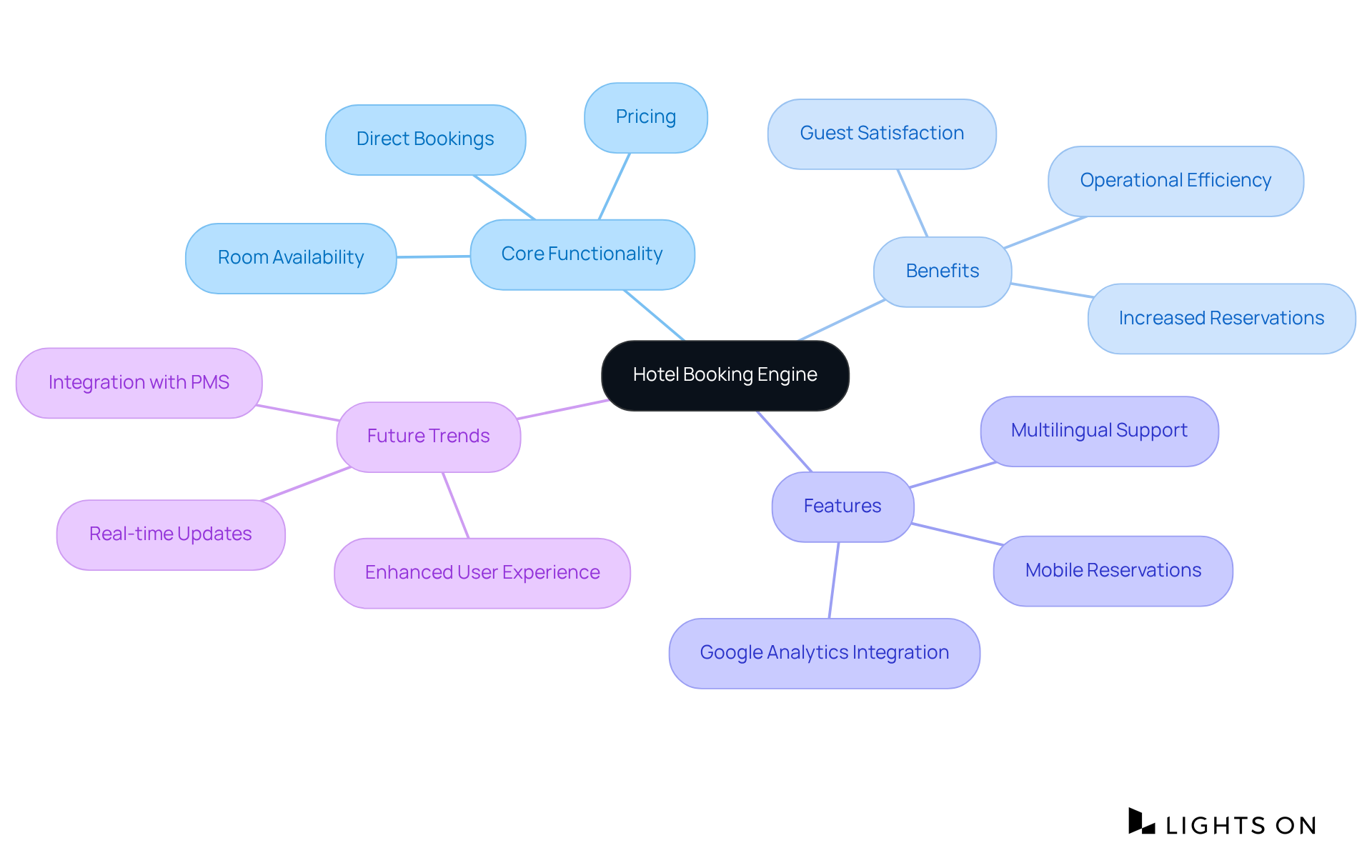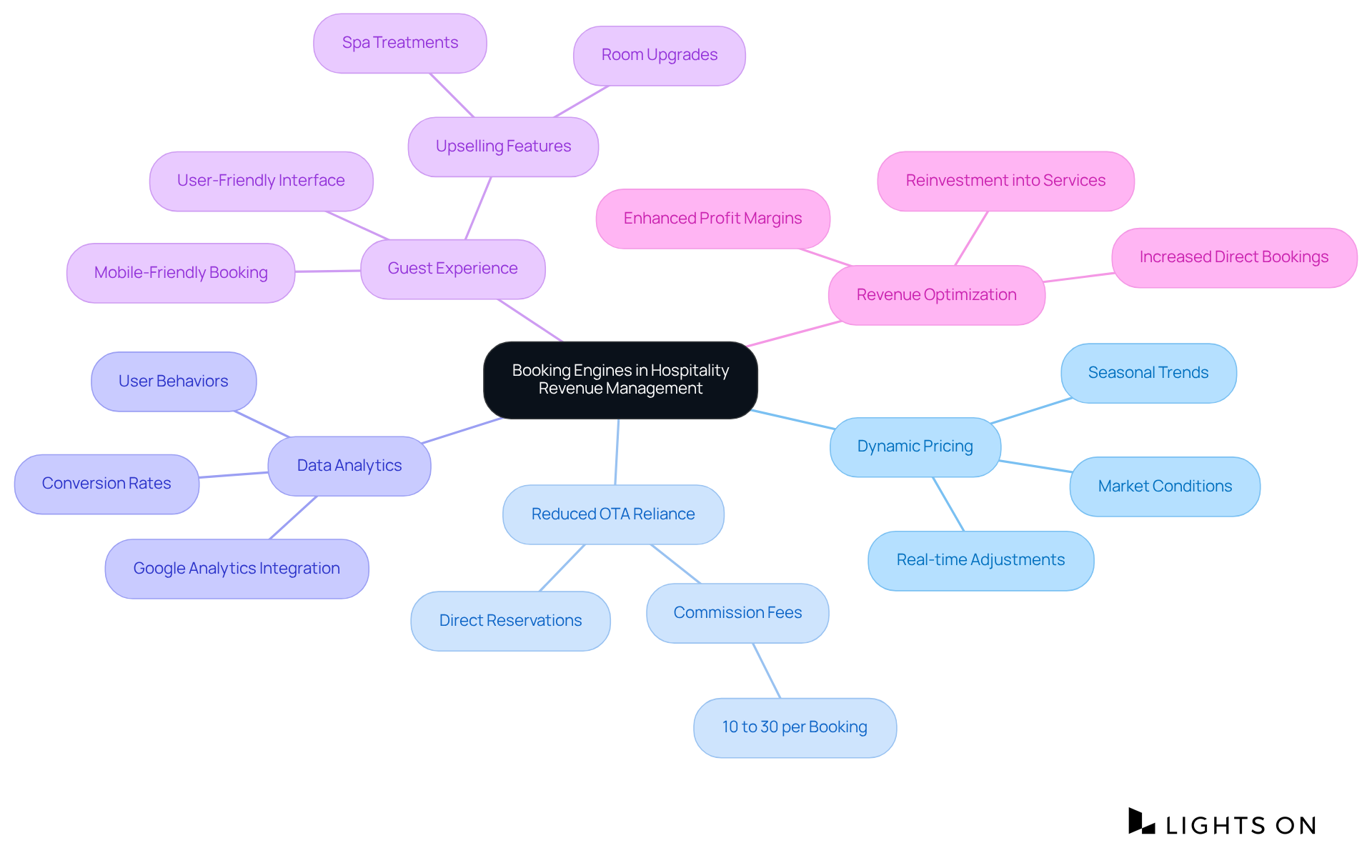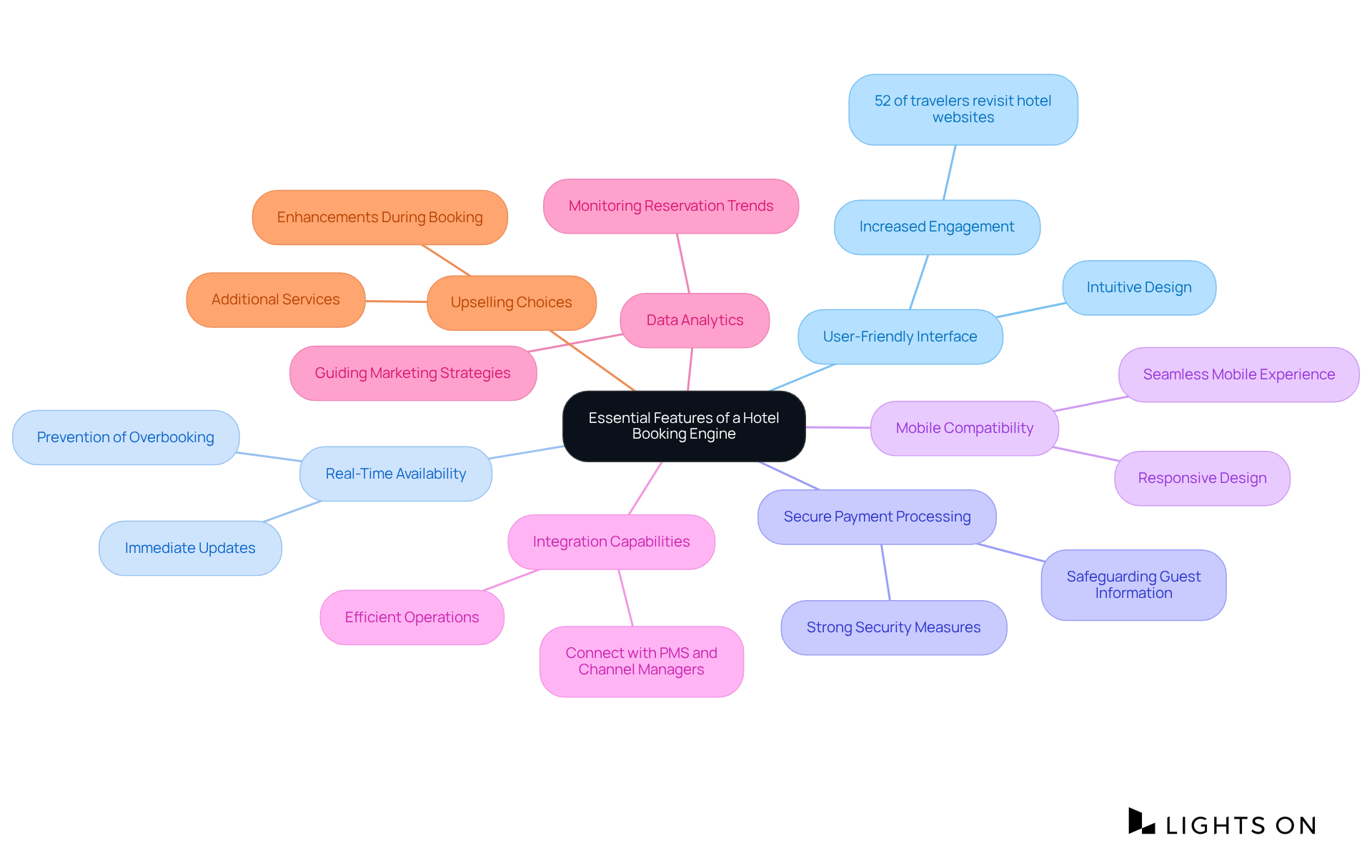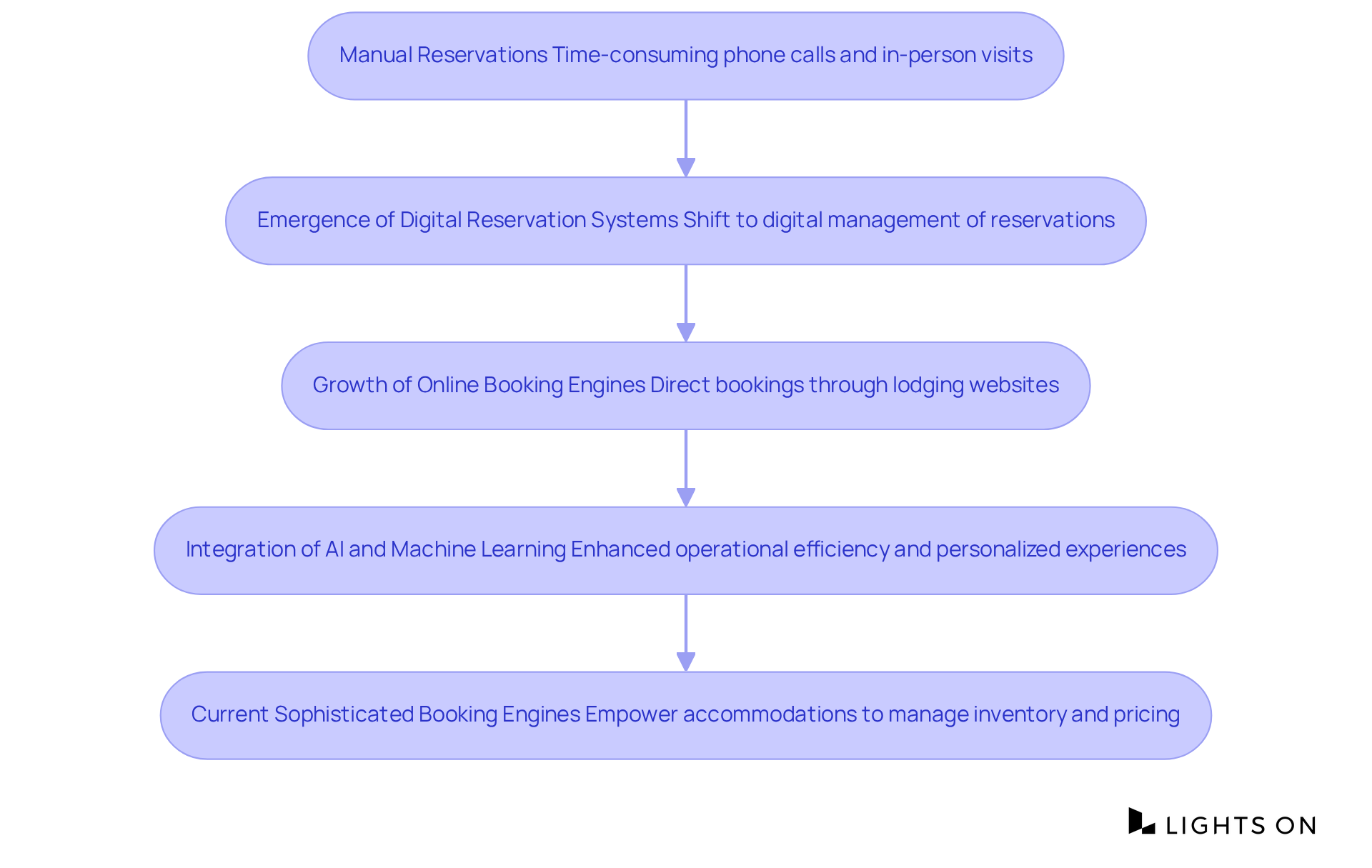The article emphasizes the critical features and significance of hotel booking engines, underscoring their pivotal role in enhancing guest experiences and optimizing revenue management. It articulates how these engines facilitate direct reservations, seamlessly integrate with operational systems, and leverage data analytics for strategic pricing and marketing. This ultimately results in increased direct bookings and improved financial performance for hotels. Furthermore, the insights provided illustrate the necessity of adopting such technologies to remain competitive in the hospitality industry.
The landscape of hospitality is rapidly evolving, with technology playing a pivotal role in shaping guest experiences and operational efficiencies. Central to this transformation is the hotel booking engine, a powerful tool that simplifies the reservation process for guests and enhances revenue management for hotels.
As establishments strive to maximize direct bookings and reduce dependence on costly online travel agencies, understanding the features and importance of booking engines becomes crucial.
What challenges do hotels face in integrating these systems? Furthermore, how can they leverage them to boost profitability and guest satisfaction?
A hotel serves as an seamlessly integrated into a hotel's website, empowering visitors to make arrangements directly online. This platform serves as the digital gateway for prospective guests, providing immediate access to room availability, pricing, and the ability to with ease. The primary function of a booking engine is to enable , significantly reducing reliance on online travel agencies (OTAs) while enhancing . By 2025, it is projected that approximately 70% of accommodations will utilize reservation systems, underscoring their critical role in the hospitality sector.
By streamlining the booking engine, these systems not only elevate the but also improve operational efficiency for hotels. Successful implementations of reservation systems have shown that a booking engine can , leading to a 14% increase in direct reservations while simultaneously minimizing manual errors and boosting customer satisfaction. Furthermore, the integration of reservation systems with Property Management Systems (PMS) and channel managers enhances inventory oversight and mitigates the risk of double bookings, thereby .
Features such as mobile reservations, , and Google Analytics integration further enrich the reservation experience and . Investing in a robust booking engine is imperative for establishments aiming to thrive in a competitive landscape, as it directly contributes to increasing revenue and fostering guest loyalty.

In the , are indispensable tools for effective . They empower accommodations to implement , allowing for real-time adjustments based on demand fluctuations, seasonal trends, and market conditions. By facilitating , accommodations can significantly reduce reliance on online travel agencies (OTAs), which typically charge commission fees ranging from 10% to 30% per booking. This transition not only but also enables hotels to reinvest savings into services and amenities for guests.
Furthermore, reservation platforms offer robust , including integration with Google Analytics, which aids in analyzing user behaviors and conversion rates. This data can be leveraged for targeted marketing campaigns and personalized visitor experiences, ultimately driving higher occupancy rates and revenue. For instance, accommodations that effectively utilize reservation systems have reported substantial increases in direct bookings, leading to improved financial results. Additionally, the intuitive interface of modern booking engines is essential for enhancing and minimizing cart abandonment rates. By incorporating upselling features, establishments can create additional through services such as room upgrades and spa treatments.
By aligning these systems with revenue management strategies, accommodations can , ensuring they stay competitive in a rapidly changing market.

A successful booking engine for accommodation reservations must integrate essential features to elevate user experience and operational efficiency. Key attributes include:
These features not only enhance the visitor experience but also support the establishment's overall through a booking engine. For instance, the P3 Custom booking engine demonstrates how incorporating can lead to improved guest satisfaction and an increase in direct reservations, ultimately driving revenue growth. This is illustrated by the success of Hotel Wailea, where resulted in notable enhancements in revenue and brand visibility. Furthermore, as Jordan Hollander noted, "81% of accommodation providers believe that technology will play an increasingly significant role in the success of lodging businesses over the next five years," underscoring the critical importance of efficient reservation systems in modern hospitality operations.

The development of , such as those utilizing a , reflects the broader technological advancements within the hospitality sector. Initially, reservations were managed manually through phone calls or in-person visits, a process that was both time-consuming and prone to errors. The late 20th century saw the emergence of digital reservation systems, particularly the booking engine, marking a significant shift that enabled accommodations to handle reservations more effectively.
With the internet's growth in the 1990s, , emerged, allowing visitors to secure accommodations directly through lodging websites. This transition not only simplified the reservation process but also empowered accommodations to manage their inventory and pricing strategies more efficiently. Today, sophisticated booking engines utilize artificial intelligence and machine learning, providing functionalities such as dynamic pricing, customized suggestions, and seamless integration with other accommodation management systems.
This evolution has fundamentally transformed how accommodations engage with visitors and optimize their revenue streams through a booking engine. For instance, the integration of enhances operational efficiency by automating manual tasks and providing real-time data synchronization, thereby reducing the risk of overbooking. AI-driven chatbots further improve guest interaction and communication with staff, enhancing the overall reservation experience. As a result, accommodations can now deliver a more tailored and effective reservation process using a booking engine, ultimately leading to increased conversion rates and customer loyalty.
The historical trajectory of hotel reservation systems emphasizes the critical need for hoteliers to adopt innovative technologies to remain competitive in an ever-evolving market. Notably, companies like Lights On, which manages over 50 businesses totaling $347 million in annual sales and has achieved an average year-over-year revenue growth of 47%, exemplify the .

The significance of hotel booking engines cannot be overstated; they are pivotal tools that enhance the guest experience while driving revenue growth for accommodations. By facilitating direct bookings and minimizing reliance on online travel agencies, these systems empower hotels to optimize their operations and improve profit margins. As the hospitality landscape evolves, the adoption of advanced booking engines becomes essential for establishments aiming to remain competitive and meet the expectations of modern travelers.
Key features of effective booking engines include:
The ability to leverage data analytics for targeted marketing and personalized guest experiences further underscores the importance of these tools in maximizing occupancy rates and revenue. Furthermore, the historical evolution from manual reservation methods to sophisticated digital solutions illustrates how technology has transformed the hospitality industry, paving the way for enhanced operational efficiency and customer satisfaction.
In conclusion, investing in a robust hotel booking engine is not merely a technological upgrade; it is a strategic necessity for any accommodation looking to thrive in a competitive market. As the industry continues to evolve, embracing these advanced systems will enable hotels to adapt to changing consumer behaviors, optimize revenue management strategies, and ultimately foster lasting guest loyalty. The future of hospitality hinges on the ability to harness the power of effective booking engines, making it imperative for establishments to prioritize their implementation and continual improvement.
What is a hotel booking engine?
A hotel booking engine is a software application integrated into a hotel's website that allows visitors to make online reservations directly, providing access to room availability, pricing, and the ability to finalize bookings.
What is the primary function of a hotel booking engine?
The primary function of a hotel booking engine is to enable direct bookings, which reduces reliance on online travel agencies (OTAs) and enhances revenue management capabilities.
How important are hotel booking engines in the hospitality sector?
Hotel booking engines are critical in the hospitality sector, with projections indicating that approximately 70% of accommodations will utilize reservation systems by 2025.
What benefits do booking engines provide for hotels?
Booking engines streamline the booking process, improve operational efficiency, automate scheduling, increase direct reservations, minimize manual errors, and boost customer satisfaction.
How do booking engines enhance inventory management?
Booking engines integrate with Property Management Systems (PMS) and channel managers, which enhances inventory oversight and reduces the risk of double bookings.
What features are commonly found in hotel booking engines?
Common features include mobile reservations, multilingual support, and integration with Google Analytics, all of which enrich the reservation experience and drive revenue generation.
Why should hotels invest in a robust booking engine?
Investing in a robust booking engine is essential for hotels to thrive in a competitive landscape, as it directly contributes to increasing revenue and fostering guest loyalty.
Transform your group booking strategies with Lights On and watch your occupancy soar.